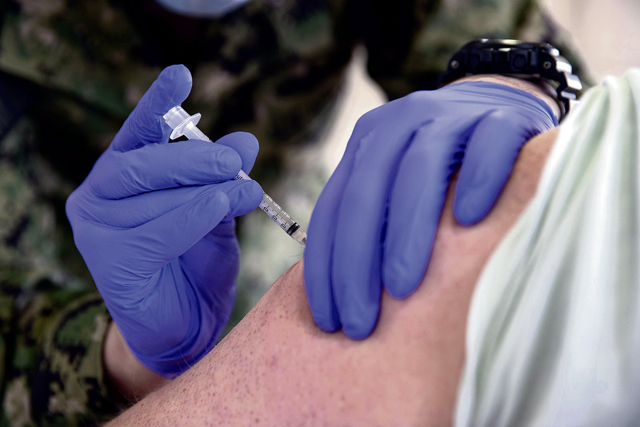
The fall and winter months tend to be the time when most people are sick with respiratory illnesses — though, these can happen anytime of the year.
The 2023 season will be the first time that vaccines for the three viruses responsible for most hospitalizations — COVID-19, Respiratory Syncytial Virusopens Health.mil, and the flu — will be available at the same time, according to the Centers for Disease Control and Prevention.
Eligible Military Health System beneficiaries can make a vaccination appointment at their military hospital or clinic or at a TRICARE retail network pharmacy at no cost.
The Food and Drug Administration approved updated COVID-19 vaccines for 2023-2024 that are aimed at fighting newer variants that are now circulating.
The CDC is recommending new COVID-19 vaccinations if not already received within the past two months, and that everyone 6-months-old and older be vaccinated against influenza and COVID-19.
Experts agree that COVID-19 vaccines, along with the flu vaccines, continue to be the most effective tool to prevent serious illness and hospitalizations. Since Jan 1, 2020, there have been an estimated 1,143,724 deaths in the United States from COVID-19, with over 146 million infections, and 7.5 million people hospitalized, according to the CDC.
“Vaccines against respiratory illnesses can reduce the chance of getting these illnesses, but more importantly, they greatly lessen the risk of becoming seriously ill from these diseases,” said U.S. Public Health Service Capt. (Dr.) John Iskander, chief of the Immunization Healthcare Division of the Defense Health Agency.
COVID-19 remains a public health threat and recent data shows an increase in hospitalizations, said Iskander. He stressed that the “very old and the very young are especially at risk.”
People over 60 should also discuss with their doctors about receiving an RSV vaccination. Two new vaccines are available for people in this age group.
Children below 8-months-old should receive the new RSV prevention shot, and children with certain medical conditions who are 8-19 months-old should get the shot as well, according to the CDC.
“Vaccines are the safest medical intervention in the world,” said Iskander.
Additional protective measures to prevent spread of disease
Vaccinations are the first tool to protect yourself, but practicing good healthy habits can also help protect you from getting sick.
Additional tools to protect yourself include:
- Wash your hands with soap and water.
- Stay home if you are feeling sick.
- Avoid close contact with sick people.
- Avoid touching your eyes, nose, and mouth.
- Cover your mouth and nose when coughing or sneezing.
- Stay in well-ventilated air spaces.
For more information go to TRICARE.mil/covid







